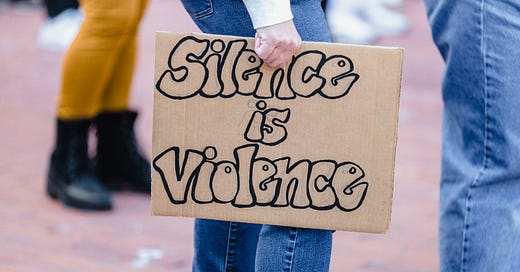#17 Season 5 of the podcast is here
featuring Juliana Servent, Strategic Partnerships lead at Fondation des Femmes

Juliana and I first chatted via Instagram during the pandemic. She came to Paris from Argentina to study at the Université Paris 8. Today, Juliana is in charge of Strategic Partnerships at Fondation des Femmes.
Founded in 2016, Fondation des Femmes provides financial, legal, and material support to charities throughout France, whose work helps to protect victims of gender-based violence. They support an estimated 500 projects, and public donations are crucial in helping them continue their work.
There are many ways to get involved with Fondation des Femmes, from becoming a volunteer, doing a sponsored run, and taking the free Stand Up training, to help fight street harassment.
I really enjoyed my conversation with Juliana. We spoke on International Women’s Day, which felt fitting. We discussed the resources provided by Fondation des Femmes and how vital it is to keep talking about gender-based violence.
When it comes to femicides and gender-based violence, the data available is sobering, and it is most likely incomplete. Governments don’t care, victim blaming still prevails, police officers aren’t adequately trained (much like rape cases), and resources are severely stretched. The demand is just too high.
Juliana describes herself as a feminist, both personally and professionally. She had her first experiences at high school and university when the Ni Una Menos (not one less) movement was gathering momentum.
Argentinian women reached their breaking point in 2016, following the murders of 14-year-old Chiara Paez and 16-year-old Lucia Pérez. Chiara was pregnant and wanted to keep the baby. Her 16-year-old boyfriend didn’t like that, and so he beat her to death. Lucia was drugged, gang-raped, then murdered. The three men arrested for her murder faced no punishment for their crimes.
In response, thousands of women took to the streets to express their anger and demand change, inspiring other Latin American countries to do the same.
Latin America is home to 14 of the 25 countries with the highest rates of femicide in the world, according to the United Nations. In Argentina, according to the Women's Office of the Supreme Court of Justice, one woman is killed every 32 hours.
(Source: NPR. “How #NiUnaMenos grew from the streets of Argentina into a regional women's movement”)
In 2018, the Ni Una Menos movement turned its attention and energy to reproductive rights. Argentina relaxed its abortion laws in 2020, granting women the right to terminate a pregnancy in the first 14 weeks.
However, it always feels like one step forward and two steps backwards.
The new President, Javier Milei, took office in December 2023, with 55.7% of the vote. Since then, his government has put an end to the Ministry of women, gender, and diversity, established by former President, Alberto Fernandez.
Javier doesn’t give a damn about gender violence policies, basically reducing them to dust, and putting the right to legal, safe, and accessible abortion at risk. The cherry on this female-shaped cake? His Vice President, Victoria Villarruel, is openly anti-abortion.
…five years later, Latin America remains one of the most dangerous places in the world for women. One in three women in the region have been subjected to violence and between 17% and 53% of women have reportedly experienced domestic violence.
(Source: The Guardian “#NiUnaMenos five years on: Latin America as deadly as ever for women, say activists”)
There is so much more to say on this subject, which I will be exploring in upcoming newsletters. For example:
Intimate partner violence in queer relationships, which we have been introduced to in In The Dream House by Carmen Maria Machado, as well as Girl, Woman, Other by Bernardine Evaristo.
Gender-based violence towards trans women and the gender expansive community.
Countries that are working with perpetrators, to break the cycle of violence.
Further reading or watching:
Paradais (Fernando Melchor)
Nos absentes : à l’origine des féminicides (Laurène Daycard)
C'è ancora domani / There’s Still Tomorrow
Juliana’s recommendations
I ask each podcast guest to share their cultural recommendations, from exhibitions, books, podcasts or films.
On top of her reading recommendations, which you can find below, Juliana shared the following:
En toute subjectivité A weekly radio show, hosted by Anne-Cécile Mailfert, President of Fondation des Femmes. It lasts two to three minutes (!) and provides an overview of feminist topics, from the cost of divorce to women’s health.
The Bell Jar by Sylvia Plath. We both came to this incredible book later in life and absolutely loved it.
Le Dilettante, for their excellent selection of second-hand books.
Shakespeare and Company Bookshop, for their beautiful editions. Juliana also listened to my podcast interview with Sylvia Whitman, owner of the store.
A note on The FBC Paris
If you’re new here, welcome! The FBC Paris is a passion project. Read our mission statement.
Follow us on Instagram: this is the best place to stay up-to-date with book club sessions.
Listen to the podcast: I chat to authors, translators, friends of the book club, and booksellers.
If there’s anything you’d like to see featured in the newsletter or have something to contribute, send an email to thefbcparis@gmail.com
Lou xx





